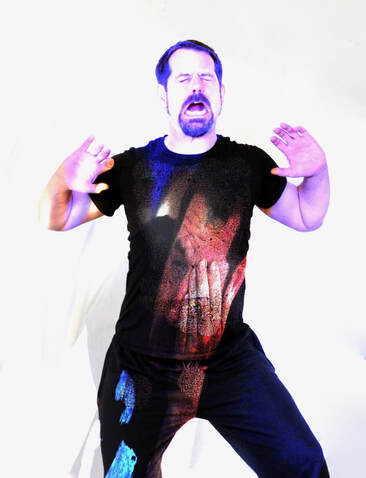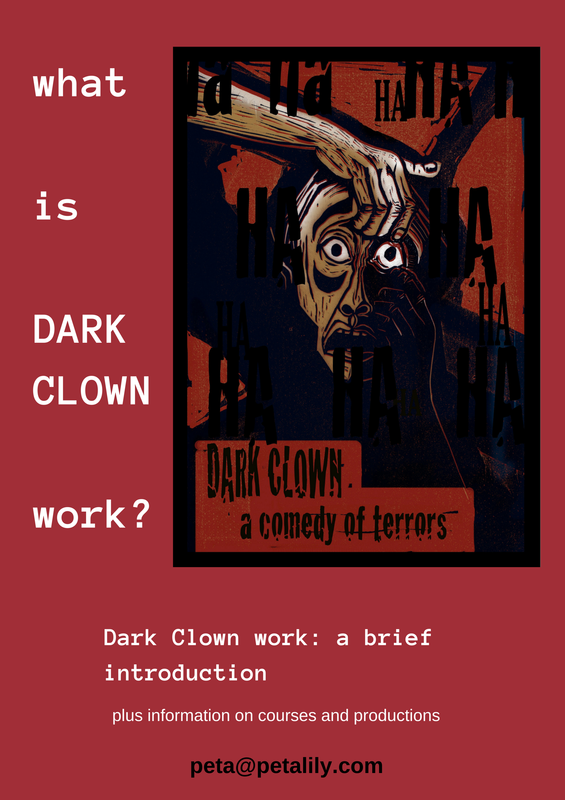 photos: Robert Piwko - overlay PL
photos: Robert Piwko - overlay PL I explained that I will aim to discourage a performer from rebelling. The reason for this is that I aim to arrange for every course participant to have the experience of tasting / practicing the Dark Side play with the Marginalised Emotions.*
In Enforced Performance we are imagining a nightmarish realm where direct disobedience will receive harsh punishment. In the line-up exercise, players in role will be punished for mistakes or failure to be intimidated by being 'shot' - please see below.** Like the shout of the Clown Professor for the Red Nose Clown, the 'shot' can serve to help the player access some compelling motif of sound and rhythm and lead to a 'success' for the player. If the player is not convincing in their release into a 'believable verisimilitude of pain and distress', they may risk being 'seriously wounded' - whereby they become a provoking and poignant obstacle for the other players who are being compelled to perform the stamping dance of the line-up exercise.
'It's really dark, isn't it?'
Sometime people come to the work and are surprised that 'Dark' describes the work rather well. Some long to misbehave, be cynical, contrary, transgressive, naughty. Over the years I have developed a set of FAQ's about the work. But many are able to understand how the Dark Clown work can provide a way to release some congested energy around atrocity, oppression and misuse of power.
Impossible Choices
Once I have 'shot' someone in such a way that they are reduced to crawling, I will side-coach them to try and stay central (usually they try to crawl off to the side). The reason for this is to serve the other players by raising the stakes for them. Once there is an injured body in the way and 'prisoners' are still trying to fulfil their task / command to come forward and then run back to recommence the stamping dance, we get to see people making 'impossible choices' i.e. 'Do I risk my life by stopping? Do I risk my life by breaking the pattern and going around? Do I risk my life by standing out in any way? Do I risk my life by showing compassion? Can I execute a clean jump over the inert body? What kind of a human being am I if I do that? What kind of human being am I now that I have done that?'
A game aimed at producing Troubled Laughter
People who are able to engage with the game without having the game's purpose obscured by any feelings of any underlying upset*** can see clearly what is at play. The exercise is designed to provide the outcome for the participants (i.e. to find out how to safely express the Marginalised Emotions; to learn how to work timing and audience awareness so as to generate laughter (engage the audience and affect their 'laughing gear'); all the while investing in imaginary circumstances well enough to portray 'a believable verisimilitude of of pain and distress' in order to create for the watcher the experience of Troubled Laughter. (Phewph).
In the interests of writing a book on Dark Clown, I created, in 2019, a questionnaire. Question #9 asks:
What value did the Dark Clown workshop deliver to you - what competencies, benefits or concepts did you gain?
An Actor / Writer replies:
'Some of the benefits are very practical. I learned the importance of breath to a performance. That simple concept can be totally transformative - just noting that breath is something I should be paying attention to changed the way I was working. The process of waking up various parts of the actor before getting into performance was useful: getting the voice working, spending a little time making sure you’re aware of different parts of the body, and exploring how a fairly abstract heightened emotional state affects voice and body. Once you’ve explored that range - stretched out, in a way - I find it becomes much easier to perform freely.
One other idea I find extremely useful is that emotions like anger and resentment have the potential to be obstructive. In the workshops we were steered away from anger, self-pity, indignation etc. in favour of less defensive emotions like shame, sadness, despair. The concept that there is a line dividing what we already consider to be negative emotions is fascinating. Knowing that the territory of slightly more egotistical or aggressive emotions is liable to put up a barrier between the performer and the audience, to create antagonism, rather than letting vulnerability build pathos and evoke empathy, is invaluable.'
And question #10 asks:
How do you see the work contributing your practice?
'My acting work has already become much freer and more expressive and interesting due to this work. My writing work is also likely to change. I think the characters I am creating will be more deeply invested in their own predicaments. Of course, that seems like something that should already have been the case, but, with a lot of my work having some aspect of post-modern, ironic distance, perhaps that has become a habit. This may also be connected with the idea of performative distance and unreality that can be present in red nose clown. After these workshops I am really appreciating the value of commitment and verisimilitude, even within absurd circumstances.'
* The Marginalised Emotions include: hyper-vigilance, fear, distress, shame, anguish, regret, guilt, humiliation, indignity, disbelief, grief, shock, absurdity, desolation, despair, physical pain, horror, terror and existential dread. (Listed in no special order).
** To be specific, if people are not looking like they are really responding to / investing in / embodying the imaginative situation, they are 'shot'. There is an ethical procedure for this - I address the course participant inside the Dark Clown exercise player and say - I am going to shoot you in your hand (or elbow) - do you, the player agree? Do not come out of the situation, just nod so I know you understand ... thank you. I will say "bang" and you will make the appropriate noise. (The group have already practiced specific sound-making for a 'believable verisimilitude of pain' in the 'Torture over Ten feet' exercise).
*** In the Introductory Talk I normalise the possibility of upset: 'Please know that should upset visit you, this is totally natural. It is natural because:
1 sometimes ‘fear of the unknown’ (‘Where it this heading?’) may contribute some unhelpful extra tension.
2 the work requires an imaginative investment in some less-than-pleasant circumstances (chosen to create sufficiently high stakes for the performer to release into the impulses of Dark Clown state)
3 as with any acting class or other psychophysical performance practice, sometimes people have emotions arise when they find themselves doing iinhabitual vocal usage or physical movement (shaking something loose)
4 there may be a detail of performing or watching a scenario that may trigger a memory or emotion - (it is not easy to give trigger warnings for the work because in all my 30 years of teaching the work, each case of upset has had a particular personal origin)
5 sometimes fear arises from people’s concern that they might be making light of the terrible suffering of others – here, the most useful thing is to remember that:
It is not the intention of the work to laugh at suffering.
It is the intention of the work to provide the audience with the experience of being surprised into the Troubled Laughter.'
There is a procedure in the case of upset, I will write about that another time.
 RSS Feed
RSS Feed
